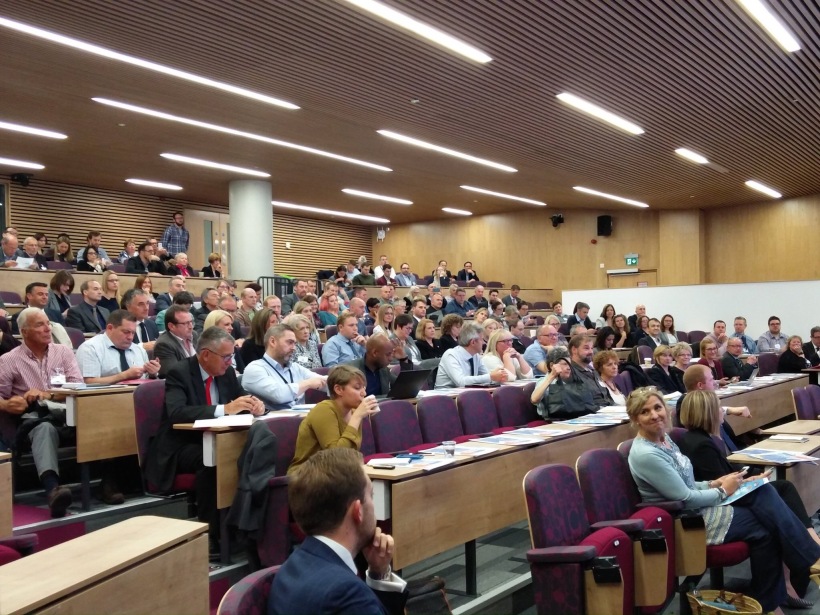The following is an amalgamation of a number of things I have written or speeches I have given over the last month. Some of it is the result of a number of people’s work and therefore I would like to thank all those in the @FlatCashEd core group.

The government’s decision to protect school funding only in flat cash terms per pupil means that schools throughout the country are facing, according to the National Audit Office, a real term cut of £3 billion by 2020.
However, in East Sussex school funding is already significantly below the national average and the impact of increasing costs will have devastating consequences.
Over the past five years schools have received a flat amount of funding for Key Stages 3 and 4. Post-16 funding for schools has been cut. Yet during this period schools have faced significant and unfunded increases in costs:
- employer’s contributions to national insurance and pensions
- the apprenticeship levy (from which many schools will get nothing back and while only 1% of employers nationally will have to pay this levy all maintained schools and most academies will have to pay)
- Living wage increases
- increases to salaries approved but not funded
- abolition of the Education Services Grant
- 80% reductions to the capital funding for maintaining school buildings
As a Headteacher I have already held difficult conversations with families of children (some with complex needs) regarding the decisions we are having to make about their child’s future. In the context of a lack of other community services, parents increasingly turn to schools to provide the support they once accessed externally. We now face the prospect of withdrawing all but basic statutory provision in order to make ends meet.
- What actions have we taken.
Since 2012 we have carefully looked at all our outgoings to be as efficient as possible. Due to a demographic shift Uplands, has been dealing with a reduced roll since then. We have used the Government document on efficiency to guide us.
1. Deploy the workforce effectively, with a focus on developing high quality teachers. Teacher quality is proven to be the single most important feature of successful education systems. The most efficient schools that we visited invest a great deal of effort to get the staffing structures right, recruiting the right people and ensuring that they are continually supported to improve.
We have reduced staffing by 9 teachers over the past 4 years. This has included reducing the SLT from 9 to 5 and removing a pastoral layer. There are a number of areas in this bullet point that make me chuckle (albeit in a slightly manic way), but mainly recruiting the right people. As i have discussed before, the Government has missed 5 out of the last 5 years’ worth of recruitment targets. We have a very efficient timetable, with very little spare capacity (10 hours). Everyone teaches more (including myself). People teach across subjects where they can
2. Make use of evidence to determine the right mix of teaching and education support staff. We have found that, particularly in the secondary phase, high attaining schools tend to spend proportionately more on teaching staff and proportionately less on education support staff than their lower attaining peers. This is still the case even when comparing schools in similar circumstances and with similar pupil intakes. However, the way schools deploy support staff is also important, with the potential to have a significant and positive impact on pupil outcomes if used in line with the evidence on what works.
Firstly, all the evidence points to ‘higher attaining schools’ being those in areas of less social deprivation. Therefore, I doubt there is the need to pay for a family key worker. Or to have paid into the services for the traveller community. Possibly not needing an onsite counsellor. We have had to lose 5 support staff over the past four years.
3. Employ or have access to a skilled school business manager who takes on a leadership role. There is strong evidence that the employment of a high quality school business manager (SBM) can enable schools to save significant amounts of money. In all the schools we visited the SBM plays a prominent role.
Done
4. Make good use of financial benchmarking information to inform the school’s own spending decisions. Schools that use benchmarking information to compare themselves to similar schools, and who act on what they find, manage to generate significant savings.
On the ones we use, our outcomes are very good for our children compared to what we spend.
5. Make use of school clusters, sharing expertise, experience and data, as well as accessing economies of scale when making shared purchases. All the schools we visited were part of some kind of cluster arrangement, and there is clear evidence that schools can drive far-reaching efficiency savings by working together with other schools.
We have looked at all of our contracts and any saving that can be found in buying through county’s economy of scale have been done. Our utilities & insurance has been sourced this way. I have cut every line of my budget where I can. I have checked every contract that is up renewal. We have reduced the amount of times our grass is cut. We haven’t spent the £100k per year that I need to to maintain my buildings that was cut from my devolved capital expenditure budget. I personally buy equipment and resources for my classes and I know that all staff do the same.
6. Manage down back office and running costs. There remains considerable variation in the amount that similar schools spend on running costs, such as energy or premises. The most efficient schools drive these costs down through improved procurement practices and a greater focus on value for money.
If you hadn’t notice this is basically an explanation of the last bullet point. But, yes of course we have done this. For example; I don’t claim expenses anymore for travel to meetings. However, inflation has grown over the last 3 years and is expected to move over 2%; fuel prices have increased etc. This is unfunded by the government.
7. Have in place a strong governing body and leadership team that challenges the school’s spending. A governing body that is willing to challenge schools on their use of workforce, their use of benchmarking information and the other aspects drawn out above, is a vital factor in encouraging greater whole-school efficiency. Where this is supported by a strong leadership team that is open to and welcoming of this challenge, schools can make significant efficiency gains.
I have a GB that has challenged me every step of the way. However, like all GB they looked at the 5 year budget predictions in 2012, assuming the best. For new HTs this means walking into a job and being faced with very difficult decisions that you could possibly say the previous HT had decided to leave.
But, let us no kid ourselves about what has been written above. State schools generally work on an 80% staffing to revenue budget. Only 1. and a bit of 2. has any impact on the largest element of a school’s spending.
What all these ‘efficiency’ savings have meant is more things falling to those left, because the amount of jobs we are required to do have increased over the same period.
- New GCSEs
- New A levels
- British Values
- E-Sfaety
- Safeguarding changes
- Finding the efficiencies that will help our budgets
- Finding grants to help our revenue streams
To name but a few
- Are the cuts required to fund the cost increases required realistically achievable?
Firstly, if my budget had kept pace with the cost increases this year (inflation, Employers Pension Contributions Teachers and the pay settlement) I would have an additional £ £142,955.31 in my budget. This doesn’t include the £100k that I lost from the Reduction in Devolved Formula Capital Funding. The £100k that I am told that I must spend to maintain my ageing capital stock.
So the short answer is now no. To a point there were efficiencies that schools could make, but we have made them Does this make schools better, no, but we have a responsibility to spend public money as efficiently as we can. However, from this point forward I can only see the cuts effecting the education of young people. It will have an impact on our students, especially in our ability to keep them safe or maintain the high standards of outcomes. But also in our ability to create well rounded adults.
Schools are also dealing with all the issues of the disappearance of the wider safety nets, such as access to CAMHS for none but they most serious. COPEs family support has to be bought in; behaviour support needs to be bought in; specific support in dealing with absence has to be bought in. Services that have an impact on our most vulnerable pupils, we have to buy in, but there is no money to buy them in anymore.
The raising of the bar in threshold levels for safeguarding referrals causes schools to be responsible for more. This is with less staff and less time
On top of that the shortfall being discovered around the country for children with high needs are being clawed back from schools, when budgets are already under huge pressure.
Apprenticeships levy again requires staffing time to run it on top of the funding that we lose to pay for it. This is when the Houses of parliament and the BBC are exempt and only 1% of employers are being asked to pay the levy.
We already have the situation that our students suffer from being in a rural community. Deprivation here is more than just income; it is access to jobs; no or very little pubic transport; no access to the arts. What will education look like for the majority of students, with no GCSEs and A levels in smaller subjects such as music, art, drama, French, Spanish?
We cannot maintain a broad curriculum (which we have had to cut already). Class sizes will grow beyond the maximum that some classrooms can hold (which is 30).
By 2019/2020
We will be dealing with £69,350.56 less in funding just because the income has not kept up with inflation. This is only if inflation remains at the Bank of England estimate of 1.7%. That equates to 2 teachers.
Even with all the reductions in staffing our staffing costs almost remain static because of the increases in associated costs, pension contribution, NI etc. For the party of business I find it hard explaining back to Conservatives that rising costs, with no rise in revenue has serious implications.
Employer pension contribution, national insurance and an estimated 1% pay rise each year mean that by 2019-20 I will have £118k less to spend on students. This is three teachers.
Then added to that we have the apprenticeship levy and the living wage means that £168k less to spend on pupils.
SO in 2019/20 as a school we will £237,780.56 less to spend on pupils just from the cost increases. This doesn’t include an attempt to keep up with maintenance costs of our buildings
BUT, as we are already funded well below the average and that continues. So like all schools we have to start to consider cuts that are not palatable to any school leader. We are not talking about luxuries we can do without, but people or service that will have profound implications for students.
- More opportunities to make savings
I am sure there are but they are shifting the deckchairs on the titanic. In fact, I recently said that the it is less like shifting the deckchairs on that ship, but actually trying to organise a tea party on it while it is broken up and on the bottom of the ocean. Staffing makes up 80% of a school’s budget. The cost increases make it virtually impossible to do anything bar lose staff.
So much is unfunded cost increases, so we are not making efficiency savings just keeping our heads above water. But expected to deal with complete changes to GCSEs and A levels without money to buy resources or train the staff.
What to do?
There has simply been no attempt to benchmark the cost of a curriculum. Just a simple look shows the following:
150 students require 5 forms of entry. So, for the three year groups, just teaching them in the traditional 1 hour lessons, that is 375 hours of teaching per week. This equates to 16 teachers required to teach that curriculum (each teaching 23 hours a week). If they were All NQTs that equates to £360k or teachers that are all top of scale that equates to £620k (these figures do not include on-costs).
Clearly, that is a simple model but one that can easily be calculated down to each pupil. (Big edit from Tom!). This gives us a starting point of £1,378 per pupil for a Key Stage 3 curriculum.
We can all appreciate the significant and collective responsibility required to secure the long term prosperity of the United Kingdom but we would urge that it is a false economy to compromise the education of a generation to secure a political or financial agenda over the next 4 years. Our young people are at the heart of this country’s future productivity and wellbeing, if their experience is significantly compromised due to the impending and real financial crisis in schools, then we will all reap the outcomes for generations to come.












